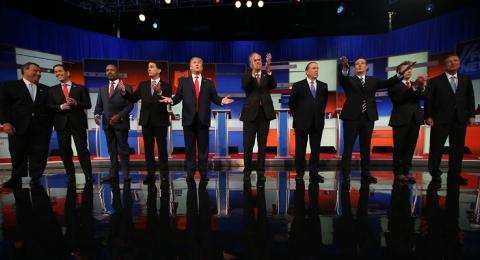The Truth about the 2016 race
Will a recession doom the Democrats?
A good or even great economy doesn’t guarantee success for the incumbent president’s party—see Al Gore in 2000—but a bad one just might guarantee failure, like John McCain in 2008. That’s not to suggest that the nominees don’t matter—both parties could end up making strong or poor choices—but if there a recession over the next year the Democrats’ chances of retaining the White House could dwindle.
The National Bureau of Economic Research has identified 22 recessions of varying magnitude since 1901—on average, that’s about one recession every five years, and the last one ended in June 2009, according to the bureau. That doesn’t mean we’re necessarily “due” for a recession; it just means that historically, recessions happen fairly regularly.
We have no idea whether a recession will strike between now and Election Day next year. It’s just a critically important factor that menaces in the background. Looking a bit further ahead, if a recession doesn’t come before 2016, it could come in 2017 or 2018, which would invariably do damage to House, Senate and gubernatorial candidates flying the president’s party banner those years.
Obama looms over the race
In the polling era, no major-party nominee has won a third term for his party when the White House incumbent has been below 50 percent. At the moment, President Obama is around roughly 45 percent approval and slightly over 50 percent disapproval in both the RealClearPolitics and HuffPost Pollster averages. No one knows whether Obama will go up, down or stay the same in the 14 months ahead, but to win the Democratic presidential nominee will need Obama either to add a few points of popularity or stimulate disproportionate turnout among those who approve of his performance. It may also be that in this partisan era, voters are more willing to affirm the party of a president whose performance in office they find lacking because they just dislike the other party so much.
This rule only applies to two-way contests. Hubert Humphrey almost won in 1968 even though President Lyndon Johnson was in the low 40s; independent George Wallace drew votes primarily from Richard Nixon, making for a photo-finish between Nixon and Humphrey. So if, say, Donald Trump broke his new pledge or another wealthy celebrity with a conservative profile launched an independent campaign, Obama’s current job approval might well be enough to elect a Democrat.
Don’t Count Bernie Sanders out in the early states
Sanders could beat Hillary Clinton in both Iowa and New Hampshire. The most recent polls in those states have found Sanders in his most competitive position yet. The Vermont senator is strongest in the Granite State, where successive polls have shown him leading. In the Hawkeye State, the latest Des Moines Register/Bloomberg survey, run by well-regarded Iowa pollster Ann Selzer, showed Clinton ahead of Sanders just 37 percent to 30 percent, though her leads are larger in other polls.
Aside from threatening in the first two states, the intensity of the crowds attending Sanders’ appearances could translate into electoral victories in several caucuses. The robust energy of Sanderistas may not win him primaries in the South or in some big states where Clinton’s resource advantages will boost her, but 14 states and four territories will use a caucus and/or convention method as a part of determining their delegate commitments for the 2016 Democratic National Convention. And we estimate that 10 of those states had nonwhite participation of less than 20 percent in their 2008 Democratic nominating elections. So the demographics in many of these contests look more favorable to Sanders than Clinton because of Sanders’ strengths with white liberals.
Moreover, Clinton has a poor performance history in caucuses. In 2008 she only won the caucus vote in one state, Nevada, and one territory, American Samoa. Obama won the Democratic nomination by combining his strength in the caucuses with big primary wins in the South and parts of the Midwest. Sanders could at least repeat the first part of that trifecta and do something Obama couldn’t do: win New Hampshire.
But Clinton remains a strong favorite for the nomination
Now for the reality check. For better or worse, the Democratic Party has placed an early bet on Hillary. In all the traditional ways—endorsements, money, media coverage—she has lapped her opposition. With respect to her announced opponents, Clinton hasn’t drawn especially potent rivals. (Compare her to Jeb Bush, who intimidated no one and drew 16 competitors on the GOP side despite having the ultimate establishment name and oodles of cash.)
Consider this: As long as the email mess doesn’t sink her, Clinton could lose both heavily white Iowa and New Hampshire, and still have a fairly unobstructed path to the nomination because of her mighty position with women and minorities. This is true even if Vice President Joe Biden enters the race.
This is not to say Hillary can’t find a way to blow it. Her inept early campaigning and bungled handling of the email controversy underline the inadequacies that helped Obama beat Clinton in 2008. But beating Hillary in 2016 would be much tougher than it was last time.
Larry Sabato,Kyle Kondik, Geoffrey Skelley

